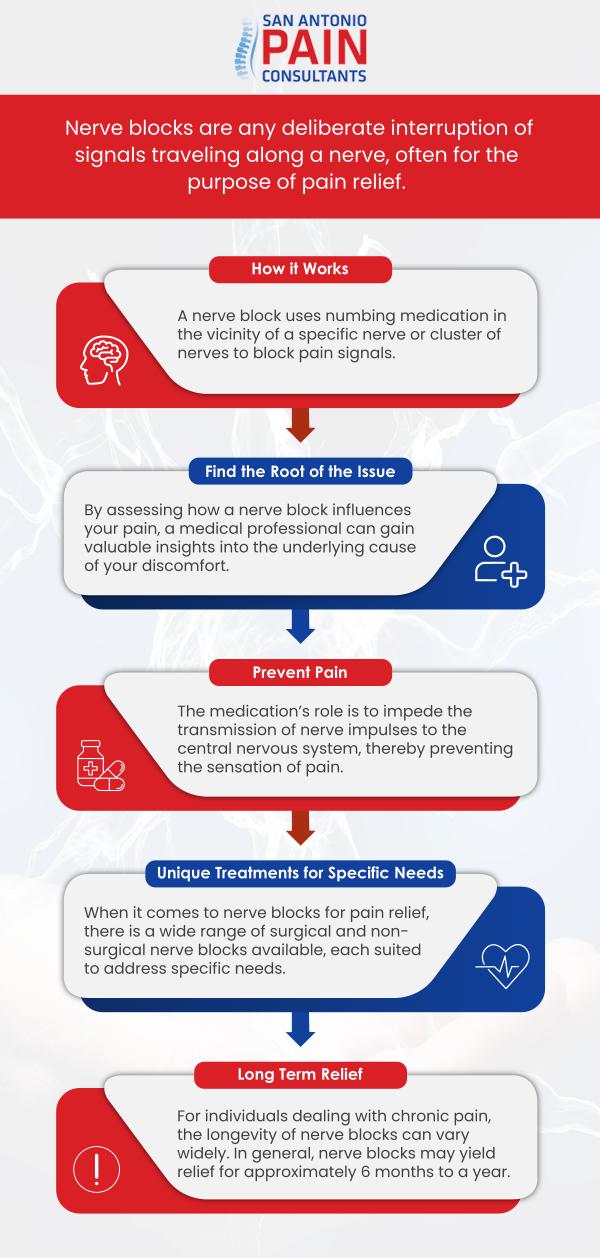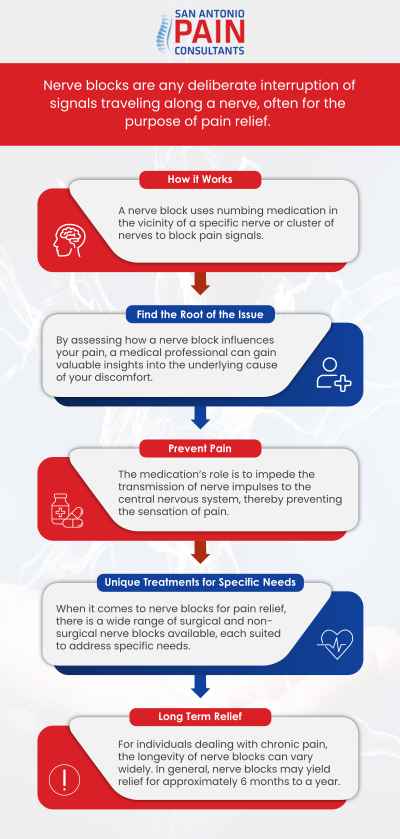Nerve Block Specialist in San Antonio, TX
Nerve blocks are medication injections used to manage pain, reduce inflammation, improve mobility, and diagnose conditions. They numb the targeted nerve, interrupt pain signals from the brain, and alleviate acute and chronic pain, aiding in recovery after surgery and managing chronic pain. At San Antonio Pain Consultants, Dr. Darius Zagunis, M.D., a board-certified pain specialist provides nerve blocks to help you manage pain and improve your condition. If you are experiencing pain that is affecting your everyday activities or quality of life, contact us or schedule a consultation today. We are conveniently located at 3903 Wiseman Blvd, Ste 117, San Antonio, TX 78251.


Table of Contents:
What is a nerve block?
Why do I need a nerve block?
How long does a nerve block last?
What happens when a nerve block wears off?
What is the average cost of a nerve block?
Diagnostic and Therapeutic Power: Dr. Darius Zagunis, M.D., and Nerve Blocks.
A nerve block is a type of injectable medication that intentionally interrupts the signals traveling through the nerves to provide regional pain relief for a temporary period of time. There also exist different types of nerve blocks which will specifically target different nerves. For example, while a genicular nerve block is meant to target nerves in your knee, an occipital nerve block may provide pain relief by targeting the nerves in the head and neck.
Nerves are the railways for signals to travel through the many parts of the body and to the brain. They are essential components that allow you to feel sensations such as touch and pain, but they are also necessary for muscle movement. In addition to this, they help maintain vital functions such as sweating, digesting, and breathing. Nerve blocks are given to address the pain signaling, yet they may impact other nerve functions too.
The effects of nerve block injections tend to be quick-acting, but, while some people may require only one injection, others may need multiple injections to achieve the desired effects. Additionally, some people will find that nerve blocks have little to no effect on them and may have to resort to alternative methods for pain relief.
As a form of regional anesthetic, nerve blocks can be utilized for both pain management during surgery and to treat chronic, long-lasting pain. Nerve blocks may also be a better alternative for some IV medications since they act immediately, reduce irritation, and combat several other side effects like nausea, itching, and respiratory depression. For some, nerve blocks can help avoid general anesthesia, and act as an alternative.
For treating chronic pain, nerve blocks may be recommended if other treatment options such as rest, anti-inflammatories, or physiotherapy prove to be unsuccessful. Nerve blocks can also be used to diagnose pain and determine its origins.
Different types of nerve blocks will be designed to do different things so they will last different lengths depending on the type of injection and the medication that is used for it. Short-term nerve blocks are the most popular kind of nerve block, and they are commonly used for epidural injections during surgery, childbirth, or arthritis. They can last 8-36 hours and are designed for pain management during the procedure. Medium-term nerve blocks are more potent, which allows for them to provide pain relief for up to 3 months. These nerve blocks are usually used for treating spinal conditions such as spondylosis, facet joints, and sciatica. Nerve blocks for surgery can last a different amount of time-based on the type of surgical procedure. For example, nerve blocks may last 6-8 hours for hand surgery, 12-24 hours for total knee replacement surgery, and 24-48 hours for lower extremity surgeries. After surgery, you should wait 24 hours to allow for the effects of the nerve blocks to go away before driving or operating any machinery.
When nerve blocks begin to wear off, a tingling sensation may be experienced 30-60 minutes before the nerves regain feeling and sensation. As they wear off, a heightened awareness of pain, itching, and feelings of pins and needles may be experienced. For surgical nerve blocks, oral painkillers are typically supplied when the effects of the nerve block begin to go away. It is important to take the pain medication when the nerve block begins to fade so that the medication has time to take effect before the nerve block wears off completely.
The cost of a nerve block will be determined by several factors including the type of nerve block, the location on the body, the cost of the healthcare provider, and your insurance coverage. However, on average, the cost of a nerve block tends to be $300 to $1,500 per procedure. Without any insurance coverage, you can expect a price of around $500 to $1,500 per procedure. If you are insured, the out-of-pocket cost will be less, but will still vary and may depend on your deductibles, copayments, and coverage specifics.
The Nerve Block Injections administered by Dr. Darius Zagunis, M.D., at San Antonio Pain Consultants serve a powerful dual purpose: they are both diagnostic and therapeutic. Dr. Zagunis uses short-acting blocks to pinpoint the exact nerve or joint responsible for chronic pain, which is crucial information for planning long-term care. Therapeutically, the injections use anesthetic and/or a steroid to reduce inflammation and numb the affected area, providing patients with significant, often rapid, pain relief. This diagnostic clarity and immediate relief are central to Dr. Zagunis’s strategy for managing complex pain that has failed to respond to general treatments.
Nerve block treatment is available at San Antonio Pain Consultants. For more information, contact us or schedule a consultation today. We are conveniently located at 3903 Wiseman Blvd, Ste 117, San Antonio, TX 78251. We serve patients from San Antonio TX, Balcones Heights TX, Fair Oaks TX, Castroville TX, Fair Oaks Ranch TX, Helotes TX, Alamo Ranch TX, Leon Valley TX, Shavano Park TX, and surrounding areas.
Check Out Our 5 Star Reviews



Additional Services You May Need
▸ Epidural Steroid Injection
▸ Lumbar Facet Joint Block
▸ Caudal Epidural Steroid Injection
▸ Sacroiliac Joint Injection
▸ Radiofrequency Rhizotomy
▸ Selective Nerve Root Block
▸ Lumbar Sympathetic Block
▸ Discography
▸ Spinal Cord Stimulation
▸ Cervical Facet Blocks
▸ Medial Branch Blocks
▸ Lumbar Epidural Injections
▸ Cervical Epidural Steroid Injection
▸ Occipital Nerve Blocks
▸ Stellate Ganglion Blocks
▸ Inspan
▸ Vertiflex
▸ ViaDisc
▸ Sacroiliac Joint Fusion – Sacrix
▸ Celiac Plexus Block
▸ Hypogastric Plexus Blocks and Ablation
▸ Sacroiliac Joint Ablation
▸ Knee Joint Ablation for Chronic Knee Pain
▸ Knee Viscosupplement Injections


